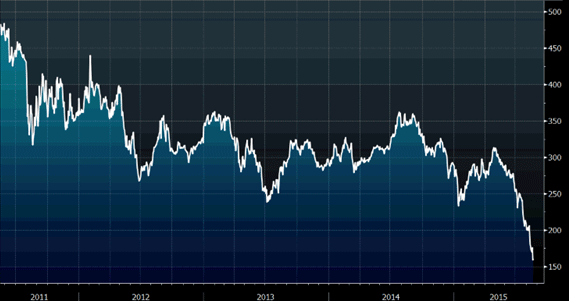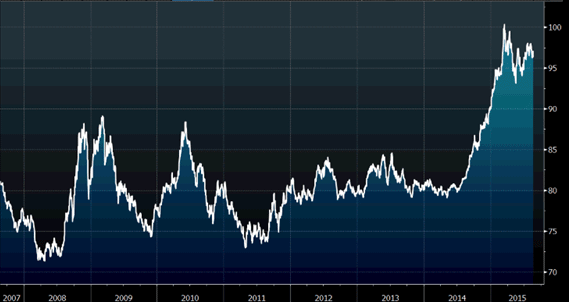The Fed will tell you when it’s time to buy back into commodities
Commodities giant Glencore sent investors a clear sell signal in 2011. John Stepek explains why investors looking to buy back into the sector should look to the Federal Reserve.

Get the latest financial news, insights and expert analysis from our award-winning MoneyWeek team, to help you understand what really matters when it comes to your finances.
You are now subscribed
Your newsletter sign-up was successful
Want to add more newsletters?

Twice daily
MoneyWeek
Get the latest financial news, insights and expert analysis from our award-winning MoneyWeek team, to help you understand what really matters when it comes to your finances.

Four times a week
Look After My Bills
Sign up to our free money-saving newsletter, filled with the latest news and expert advice to help you find the best tips and deals for managing your bills. Start saving today!

They say that no one rings a bell at the top of the market. But the truth is that sometimes they get pretty close.
In May 2011, commodities giant Glencore listed on the London Stock Exchange. It was a gob-smackingly large float by a previously fairly secretive private company. It was exactly the sort of thing that inspires even a casual contrarian to think: "Wow, that's a top of the market indicator if ever there was one."
Turned out it was. Commodities had in fact already hit their top for the cycle, in February 2011, when copper briefly poked its head above the $10,000.
MoneyWeek
Subscribe to MoneyWeek today and get your first six magazine issues absolutely FREE

Sign up to Money Morning
Don't miss the latest investment and personal finances news, market analysis, plus money-saving tips with our free twice-daily newsletter
Don't miss the latest investment and personal finances news, market analysis, plus money-saving tips with our free twice-daily newsletter
A spring bounce, which coincided with Glencore going public, turned out to be of the dead cat' variety. Since then copper prices have more than halved, as have oil prices.
The big question is: they rang a bell at the top of the commodities boom. Will anyone ring a bell at the bottom?
Glencore's painful life as a public company
Here's a chart of Glencore since it listed, just after the commodity cycle topped:
Glencore (LSE: GLEN) share price

(Source: Bloomberg)
Put simply, this is what happens when the product you deal in is collapsing in value. The company is cutting spending and selling assets and doing all the sorts of things you'd expect.
But against a brutal backdrop for commodities, it's hard to see things turning around fast.
Yesterday, oil prices tanked again. The trigger for yesterday's particular crash was the news that US crude stocks had risen, rather than fallen, as analysts had expected. The West Texas Intermediate (WTI) benchmark slipped to around $40 a barrel, the lowest since 2009. According to Citi, the 2008 financial crisis low of $32 a barrel is now a "conceivable reality".
Meanwhile, copper is at its lowest level since 2009, dipping below $5,000 a tonne.
Is anyone going to ring a bell at the bottom?
It's the usual boom and bust story. It's in the nature of the production of resources. Commodities get cheap. So companies stop looking for them, and stop pulling them out of the ground.
Then, because they're cheap, everyone uses too much of them. They start to get expensive again. Demand outstrips supply.
But it takes companies time to get back into gear. And by the time everyone wakes up to the bull market, it's practically over. Because companies are pumping and mining again, ridiculous deals are being done, grandiose projects are being funded, and fringe sources are coming into play. Supply outstrips demand.
Companies cut back. Some go bust. The fringe projects get shut down. And so the cycle starts all over again.
This is all bad news for miners and oil producers and explorers, and the related stocks and bonds. But for the wider economy, it's hard to see the downside.
Cheap oil is a good thing. Cheap energy is a good thing. Cheap raw materials that's a good thing. We all need this stuff. So the lower the price, the better. The more efficient the production, the better.
For me, the big question now is whether or not anyone is going to ring a bell at the bottom.
I can't see anything obvious yet certainly not as obvious as Glencore's float. We haven't seen any real monsters going bust yet. And while there's a fair amount of tech utopianism around about electric cars (see your average sales pitch for Tesla shares), it's not widespread enough to be a screaming buy signal.
Another way to view the commodities bust
You see, the other thing that happened in early 2011 not long before Glencore floated, oddly enough is that the US dollar made its post-2008 low. Check out the chart below.
US dollar index

(Source: Bloomberg)
Funnily enough, what with commodities being priced in dollars, a strengthening dollar hasn't been too good for their prices.
You might also note that the oil price collapse started from about mid-2014. Which is when the US dollar bull market really ramped up a notch.
And the recent tumble in oil which had been recovering somewhat has clearly not been helped by money fleeing to the dollar as China scares the horses with its currency and stockmarket shenanigans.
So another way to look at the commodities question is what could stymie the US dollar's rise?
We got a hint yesterday. The minutes from the latest Fed meeting at the end of July contained plenty of hints that the Fed might pull back from raising rates in September, as has been expected. Some Fed members were already worrying about China (remember this is before the renminbi devaluation), while others were commenting on falling commodity prices.
History so far suggests that the Fed will only tighten monetary policy when it feels it has no other option. That seems to be far from the case right now. And once the market starts to believe that a rate rise isn't coming in September and perhaps not even this year then that could be the signal for a commodities rebound, I reckon.
I'd start making a shopping list just now. Resources specialist Alex Williams looked at some mining stocks he thought could thrive in an issue of MoneyWeek magazine earlier this month. If you're not already a subscriber, get your first four issues free here.
Get the latest financial news, insights and expert analysis from our award-winning MoneyWeek team, to help you understand what really matters when it comes to your finances.

-
 How a ‘great view’ from your home can boost its value by 35%
How a ‘great view’ from your home can boost its value by 35%A house that comes with a picturesque backdrop could add tens of thousands of pounds to its asking price – but how does each region compare?
-
 What is a care fees annuity and how much does it cost?
What is a care fees annuity and how much does it cost?How we will be cared for in our later years – and how much we are willing to pay for it – are conversations best had as early as possible. One option to cover the cost is a care fees annuity. We look at the pros and cons.
-
 This is one bull market you don’t want to miss
This is one bull market you don’t want to missFeatures It’s little wonder gold has taken off, given that investors didn’t get the rate rises they were expecting, says Alex Williams. But there is one sector that is doing even better.
-
Boom times for gold miners
Editor's letter One despised asset class that MoneyWeek has long been bullish on has done rather well. John Stepek explains why he's sticking with gold miners.
-
Snap up some gold miners
Editor's letter When the conditions are right, gold mining stocks will “rip”. Merryn Somerset Webb explains why.
-
 Why I’m not afraid of China’s slowdown affecting Latin America
Why I’m not afraid of China’s slowdown affecting Latin AmericaFeatures China's slowdown has got investors in commodity-rich Latin America running for the hills. But that, as James McKeigue explains, is a costly mistake.
-
 How to profit as Australia’s economy finally runs out of luck
How to profit as Australia’s economy finally runs out of luckTutorials The Australian economy bucked the worst of the financial crisis, but now its luck has run out. Matthew Partridge reveals the best way to profit from the downturn.